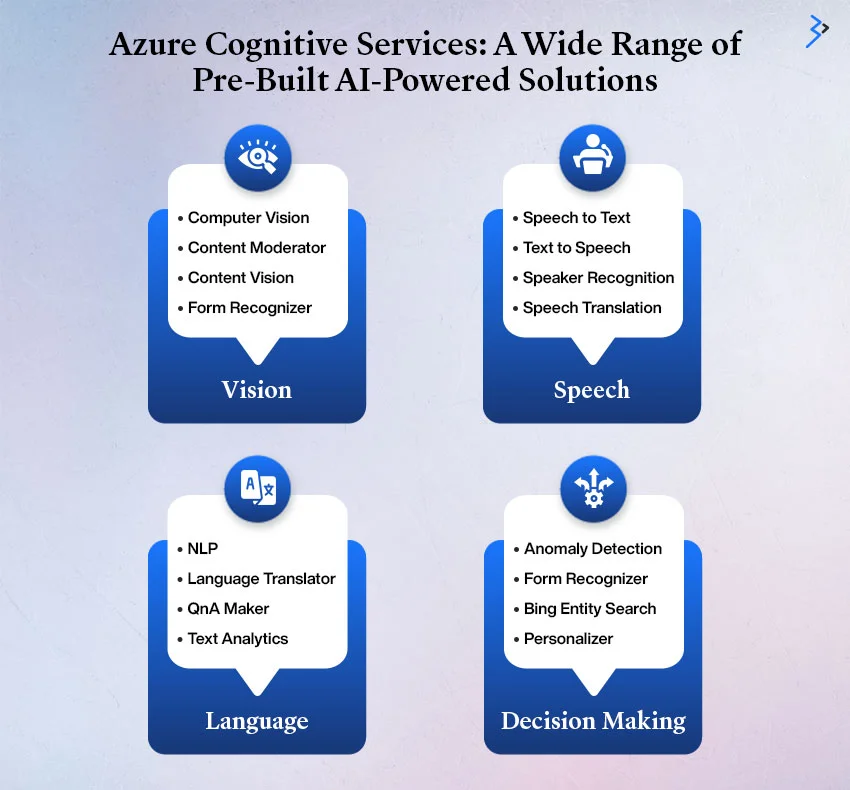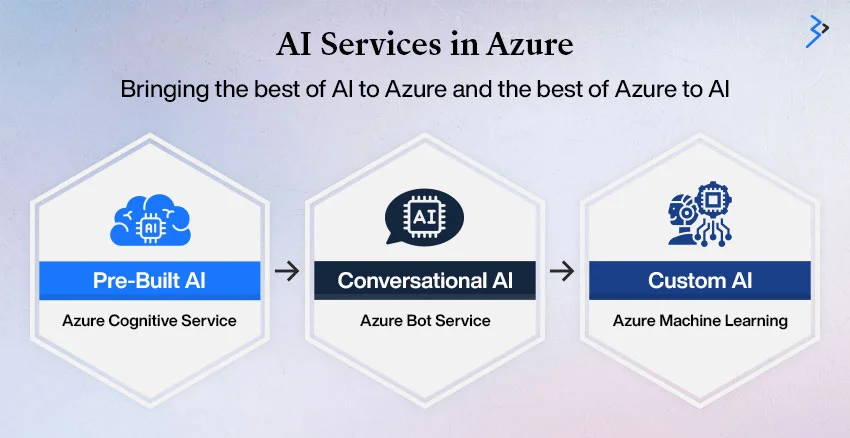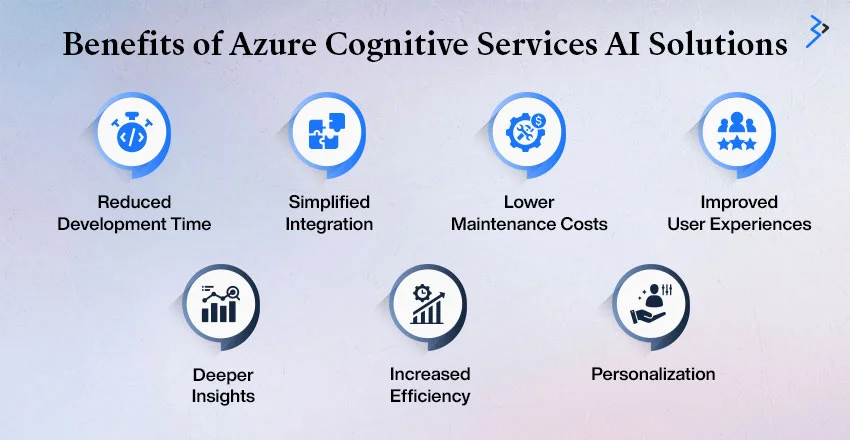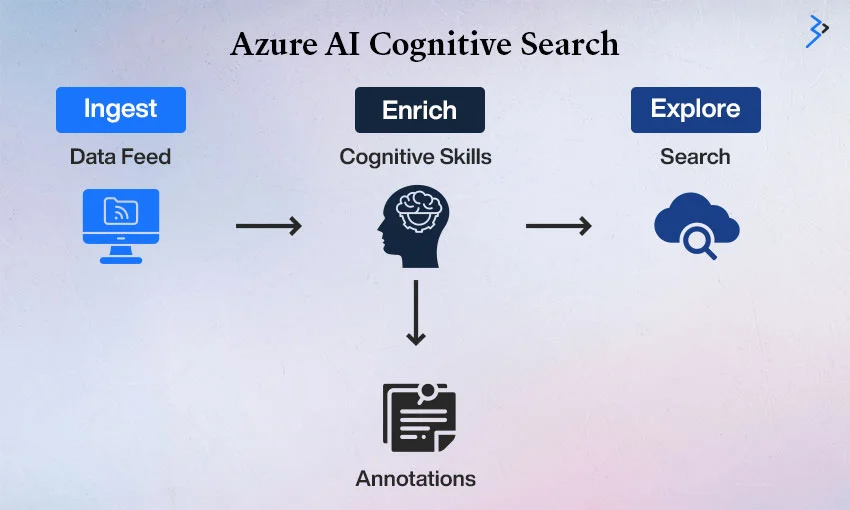Introduction
AI has become an integral part of our lives thanks to its rising prowess over the past few years.
Today, Artificial Intelligence is easily found in almost every aspect of our technology, making it relevant to everyday activities. AI technologies are revolutionizing our businesses, helping us interact with machines and improve our lifestyles with voice assistants and recommendation systems.
Sadly, deploying AI capabilities from scratch can be challenging and time-consuming, as can understanding and implementing different aspects of AI.
However, that’s where Azure Cognitive Services step in for modern business owners. Implementing AI-powered solutions via Microsoft Azure enables businesses to access a collection of pre-built AI functionalities offered by Microsoft on its Azure cloud platform. These services are designed to be easily integrated into applications by developers, even those without a background in machine learning, allowing them to add AI capabilities to their creations.
Therefore, this blog looks at the different aspects of the Microsoft Azure cloud platform and how it can improve your operations in the long run. Continue reading as we uncover more about this next-gen AI technology in the following sections.
Understanding the Azure AI Ecosystem – What is it About?
Let’s be honest for a second. When discussing the Azure AI ecosystem, we enter a realm where innovation meets reality head-on. Azure AI is more than just technical jargon; it represents the heart of modern application development and data analysis.
Consider this: a package of cognitive services, artificial intelligence capabilities, and machine learning ready to elevate your projects from “average” to amazing.
Microsoft Azure AI does not play around. Azure AI provides the tools to build more intelligent apps faster than ever. The best part? You don’t need to be an AI expert or have massive amounts of data at your disposal.

Why Pre-built AI Solutions for Your Operations?
So, why should your business leverage pre-built AI solutions?
Because they are game-changers! While you could spend endless hours creating these skills through machine learning, Azure Cognitive Services provides refined capabilities. We’re talking about easy integration into your apps with little fuss.
- Ease: You do not need datasets or to learn data science; everything is done for you.
- Simplicity: Adding voice recognition or language translation API to any program only takes a few lines of code.
- Versatility: Whether you’re building web apps, mobile apps, or everything in between, there’s something for everyone.
Essentially, these pre-built solutions are more than shortcuts; they are roads that go directly to innovation without becoming mired down by the complexity typically connected with artificial intelligence breakthroughs. They enable developers and organizations to effortlessly harness robust technologies and bring their AI-powered applications to life in record time.
Azure Cognitive Services: A Wide Range of Pre-Built AI-Powered Solutions

Microsoft Azure Cloud Services offers a package of artificial intelligence (AI) capabilities that add intelligent features to applications. These pre-built solutions enable organizations and developers to incorporate AI into their products without requiring a substantial understanding of data science or machine learning.
Azure Cognitive Services spans several areas, including vision, voice, language, decision-making, and search, and provides cutting-edge solutions for various use cases.
Let’s explore the unique offerings in each category:
Vision
1. Computer Vision
Azure’s Computer Vision analyze visual content to extract information such as objects, faces, and text from pictures and videos. It is used to identify objects, recognize faces, and interpret scenes, allowing for applications such as picture categorization and content labeling.
2. Content Moderator
This AI-powered solution detects objectionable text, photos, and videos, ensuring safe, regulated web content. It automates the reporting of problematic content, making it vital for platforms that rely on user-created content.
3. Custom Vision
Custom Vision enables enterprises to train their AI models on unique picture identification tasks. It is designed for specific use situations in which off-the-shelf models may be insufficient. Users may label data and train machine learning models to detect certain items or circumstances, making it adaptable to end users.
Speech
1. Speech Services
Azure Speech Cognitive API allows developers to integrate voice recognition, text-to-speech, and speech translation into their applications. These services may be used for customer care chatbots, voice-activated devices, and more.
2. Speaker Recognition
This service detects and validates individual speakers, enabling voice-based personalization of user experiences. It is beneficial when speech is the primary authentication technique, such as secure systems and voice-activated personal assistants.
Language
1. Natural Language Processing (NLP)
NLP enables robots to interpret and process human language. Azure’s natural language processing (NLP) technologies allow applications to extract meaning from text, such as sentiment analysis or key phrase extraction, which may be used for customer feedback analysis and chatbots.
2. Language Translator
The language translator feature enables real-time translation across many languages, making international business communication more accessible, facilitating cross-border e-commerce, and offering global customer support.
3. QnA Maker
QnA Maker generates conversational question-and-answer systems by combining data from various sources, such as articles or FAQs. This technology facilitates the creation of AI-powered customer service chatbots.
4. Text Analytics
The platform provides a comprehensive tool for deriving insights from text, including entity identification, sentiment analysis, key phrase extraction, and language detection. It can manage significant social media data, polls, and client feedback.
Decision
1. Anomaly Detection
Anomaly detection uses machine learning to find odd patterns in data, which may aid in fraud prevention, system health monitoring, and real-time detection of unexpected activity.
2. Form Recognizer
Form Recognizer takes crucial information from structured and unstructured documents, including receipts, invoices, and forms. It enables firms to automate data entry, enhancing document handling efficiency.
3. Bing Entity Search
The Bing Entity Search enables apps to search the web for relevant information about people, places, things, and concepts using Microsoft’s Bing search capabilities, improving user interactions’ contextual relevance.
4. Personalizer
Personalizer provides real-time customizing to users by learning from previous encounters. It contributes to individualized user experiences, such as suggestions or targeted content distribution.
Read more: Azure AI – Building Intelligent Applications

Other AI Services
Azure Cognitive Search
Azure Cognitive Search is a cloud-based service that uses AI to deliver enhanced search capabilities. It enables organizations to create search experiences that produce relevant results by evaluating massive amounts of structured and unstructured material.
Benefits of Azure Cognitive Services AI Solutions

The benefits of integrating Microsoft Azure Cloud into your operations can be broadly categorized into two areas: increased developer productivity and enhanced application capabilities.
Let’s learn about these features individually in the following sections.
Increased Developer Productivity
Reduced Development Time
Thanks to Microsoft Azure cloud architecture, Azure Cognitive Services can potentially reduce project development time by nearly 50%. The Cognitive Services provides developers with scalable, high-performance AI capabilities to manage large amounts of data and scale effectively over time.
What’s more? Thanks to the seamless deployment, organizations can easily leverage Azure Cognitive Services for applications that require real-time processing of vast data. Azure’s global reach benefits developers from low latency and high availability, ensuring a seamless experience for clients in several regions.
Read more: Microsoft Introducing ML.NET: A Blend of Machine Learning and .NET
Simplified Integration
Azure Cognitive Service’s seamless integration with other Azure services makes it the go-to option for developers. They leverage the simplified integration to design end-to-end AI solutions inside a single ecosystem.
For example, developers may utilize Azure Machine Learning to deploy unique models as a spin-off of cognitive services after they train them with the required data. This link enables distinct teams working on different aspects of AI application development to cooperate more quickly and efficiently.
Lower Maintenance Costs
Azure Cognitive Services helps organizations decrease maintenance costs by offering pre-built, scalable AI solutions that eliminate the need for bespoke development and continuous maintenance. These services are cloud-based, so businesses do not need to invest in costly infrastructure or hire specialist AI professionals.
Microsoft provides automatic updates and assistance to keep the services up to current, secure, and dependable. This allows organizations to prioritize innovation and development over infrastructure administration. Azure assists businesses in drastically lowering operating and maintenance expenses by reducing the complexity and overhead associated with maintaining AI capabilities internally.

Enhanced Application Capabilities:
Improved User Experiences
Azure Cognitive Services improves user interactions by incorporating AI-powered capabilities such as natural language comprehension, voice recognition, and visual processing into apps. These techniques make interfaces more intuitive, accessible, and responsive, allowing consumers to interact with technology easily.
The platform provides richer, more dynamic experiences via speech-enabled applications, real-time language translation, or picture recognition. Azure helps organizations boost customer happiness and overall engagement by making apps more intelligent and capable of understanding user intent. This results in applications that seamlessly adapt to and anticipate user demands.
Deeper Insights
Azure’s AI services assist organizations in analyzing and comprehending enormous amounts of data, transforming it into actionable insights. Text analytics and anomaly detection tools let firms extract meaningful information from customer comments, documents, and financial data.
This allows for a better knowledge of market trends, customer behavior, and operational inefficiencies. Businesses may improve their performance by processing complicated datasets quickly and accurately. The capacity to obtain deeper insights enables firms to remain competitive and data-driven.
Increased Efficiency
Azure Cognitive Services eliminates repetitive tasks and streamlines procedures, increasing productivity across several corporate functions. Automated document processing, real-time transcribing, and content moderation eliminate the need for manual involvement, saving time and money.
It enables firms to focus on high-value operations while increasing productivity. Azure helps organizations speed up operations like form processing, customer support, and content management by integrating intelligent automation into workflows, resulting in shorter response times and lower operating costs.
Personalization
Azure Cognitive Services personalizes user experiences using AI to adjust information, suggestions, and services to individual preferences. Businesses may employ machine learning and behavioral analysis to build personalized experiences that respond to consumers’ previous behaviors, preferences, or requirements.
Personalization improves engagement, user pleasure, and client loyalty by providing relevant material or experiences in real-time. Whether through speech recognition or recommendation engines, Azure enables businesses to offer highly focused and relevant experiences that make customers feel appreciated and understood.
FAQs
Language Understanding (LUIS) for deciphering natural language, QnA Maker for translating material into interactive question-and-answer formats, and Speech Services for speech recognition and text-to-speech are among the Azure Cognitive Services available for conversational AI. These services enable developers to build intelligent, engaging chatbots and voice assistants.
Azure Cognitive Services provides AI capabilities in vision, speech, language, decision-making, and search. These include picture analysis, audio recognition, natural language processing (NLP), text analytics, anomaly detection, and personalized recommendations. These characteristics make embedding intelligent functionality into applications easier without requiring extensive AI knowledge.
Azure Cognitive Services facilitates the implementation of various AI capabilities, including picture recognition, speech-to-text, language translation, content moderation, and anomaly detection. These pre-built AI models speed up the creation of intelligent apps, allowing organizations to quickly add advanced features such as conversational AI, decision-making, and automated document processing.
Azure Cognitive Services developers can access substantial documentation, SDKs, code samples, tutorials, and training courses through the Microsoft Learn platform. Azure also offers community forums, technical support, and Azure AI services for tailored help, allowing for the seamless creation and integration of AI solutions.
Yes, Azure Cognitive Services may be tailored to unique business needs. Tools like Custom Vision, LUIS, and QnA Maker enable developers to train models on private data and tailor AI behavior to specific requirements, providing flexibility in healthcare, retail, and finance.
Azure Cognitive Services stands out for its diverse pre-built AI models in vision, voice, language, and decision-making. It provides easy connection with the Azure cloud, scalability, and reliable support. While competing with platforms like Google AI and AWS, Azure’s flexibility and enterprise-grade security make it an attractive option for many companies.
Related Articles
-
Uplift the Storage Game With Azure Data Lake Analytics
In the realm of Data Science, Azure development has appeared to be one of the most influential domains. This started in October 2008 privately with the name ‘Project RedDog’. In
-
8 Reasons Why Microsoft Azure Cloud Is the Best
Microsoft Azure is the most popular public Cloud services provider in the market today, powering 90 percent of the Fortune 500. They are also providing services tailored to small businesses
-
Automating Workflows with Azure DevOps: A Complete Guide to CI/CD, Repos, and Release Automation
In the rapid landscape of software development, automating routine tasks and optimizing deployment pipelines has become essential rather than optional. Automating workflows with Azure DevOps empowers development teams to ship




